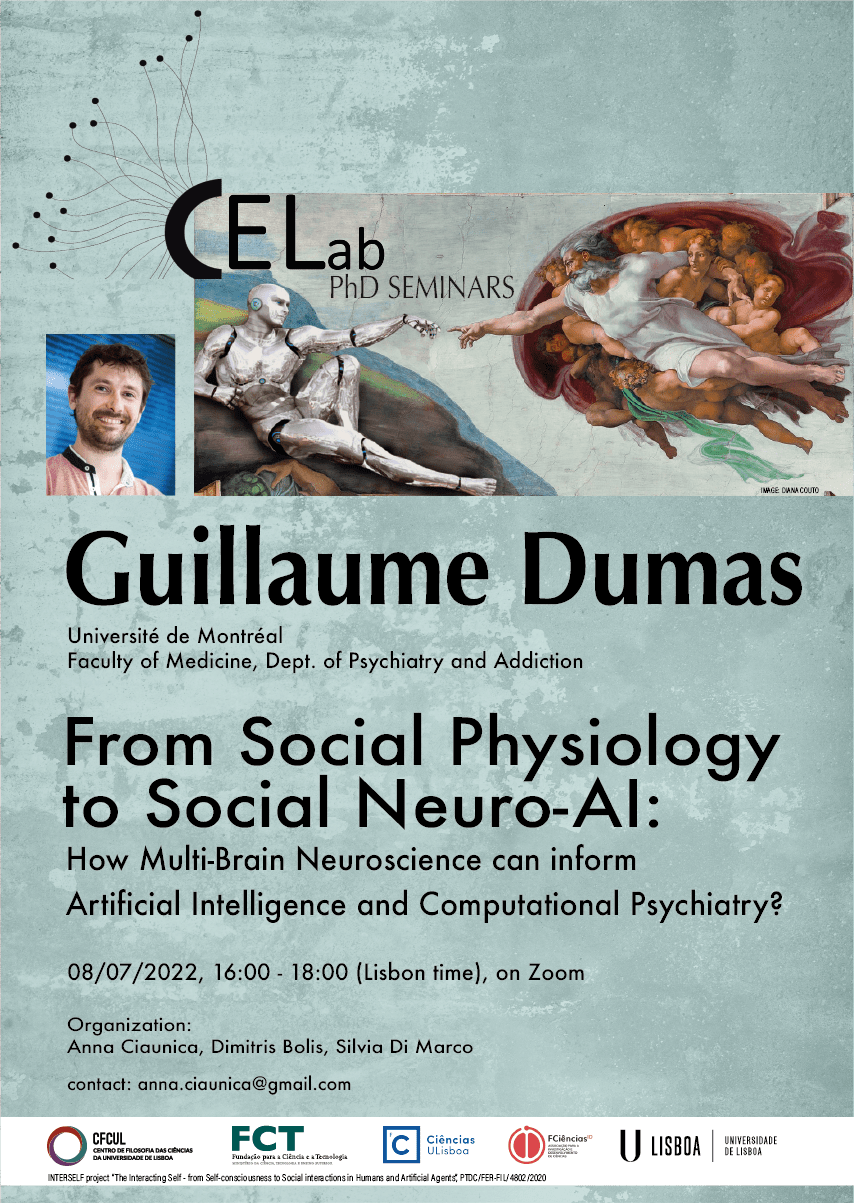
O seminário decorre às 16:00 (horas de Lisboa), online.
Link Zoom
https://videoconf-colibri.zoom.us/j/84163383961?pwd=VeRhFQQEmdnV1OF6UQDSHwPMCv7ZZT.1
Password: 851472
Abstract
Cognitive sciences have approached social cognition from two complementary perspectives. On one hand, social psychology and behavioural economics have mostly emphasized mentalizing, social perception, and our ability to model other minds. On the other hand, developmental psychology and motor neuroscience have more focused on imitating, social interaction, and our propensity to coordinate with others’ behaviour. This polarization leads to a « chicken-egg paradox » regarding the origin of social cognition in humans: while the former claim that we need to model others to interact with them; the later argue that we first need to interact with others to model their minds. Those two perspectives are on top operating at different levels of explanation with different conceptual and mathematical formalisms. For instance, while social computations during offline economic games are very well captured by Bayesian statistics, social coordination during sensorimotor coupling is better modelled using dynamical systems. In this talk, I will illustrate how we can operationalize a « social physiology » modelling human cognition as a multi-scale complex system that interfaces biological and social processes. The term « physiology » was introduced by Claude Bernard not as a medical subfield but rather as a systemic and integrative posture towards biological functions (1865). Here, we will expand this posture by including social functions as well, using experimental approaches in both real and artificial agents. We will start with multi-brain neuroscience and how inter-brain connectivity provides a quantitative marker for bridging the gap between intra-personal mechanisms and inter-personal dynamics. Then, we will continue with neuro-inspired artificial intelligence and how the observations initially decribed in interactive social neuroscience can inspire architectures for virtual avatars and machine learning algorithms. Finally, we will discuss the case of mental health and how such a social physiology is inevitably calling for the development of a computational psychiatry beyond the boundaries of individuals’ skulls.
Nota biográfica
Guillaume Dumas (https://www.extrospection.eu) is an Assistant Professor of Computational Psychiatry in the Faculty of Medicine at the Université de Montréal, and the Principle Investigator of the Precision Psychiatry and Social Physiology laboratory at the CHU Sainte-Justine Research Center. He holds the IVADO professorship for “AI in Mental Health”, and the FRQS J1 in “AI and Digital Health”.
He held a previous appointment as a permanent researcher in Neuroscience and Computational Biology at the Institut Pasteur (Paris, France). Before that, he was a postdoctoral fellow at the Center for Complex Systems and Brain Sciences (FAU, USA). He holds an engineering degree in advanced engineering and computer science (Ecole Centrale Paris), two MSc degrees (theoretical physics, Paris-Saclay University; cognitive science, ENS/EHESS/Paris 5), and a PhD in cognitive neuroscience (Sorbonne University).
His research aims at cross-fertilizing AI/ML, cognitive neuroscience, and digital medicine through an interdisciplinary program with two main axes:
– AI/ML for Mental Health, creating new algorithms to investigate the development of human cognitive architecture and to deliver personalized medicine in neuropsychiatry using data from genome to smartphones.
– Social Neuroscience for AI/ML, translating basic brain research and dynamical systems formalism into neurocomputational and machine learning hybrid models (NeuroML) and machines with social learning ability (Social NeuroAI & HMI).
Contacto
anna.ciaunica[a]gmail.com